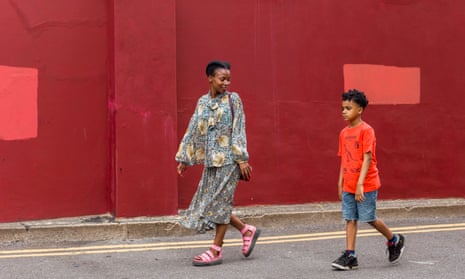On 14 February 2012, Fran took her two children, both aged under five, and left her partner of 10 years. Their relationship had broken down. “He went to work. By the time he came back, we’d gone. We took no clothes, nothing. We just walked. I went into a photo booth and took a photograph of the three of us: I call it my liberation photo. I never looked back.”
She had to give up a job she loved to look after the children. “I worked for the ambulance service and there was no one to look after the children when I was on nights,” she says. Like many single parents, she then struggled to find a place to live, because those on housing benefits are affected by discriminatory, blanket “no benefits” bans. “I couldn’t tell the landlord I was on benefits. He lived next door, and kept asking, ‘Are you working?’ I had to hold it together for six months before my new job started. I’d take a packed lunch and go out all day, to make him think I was going to work.”
Single parents are no longer a tiny minority: one in four families are single-parent households; about 90% are with a single mother. Holding The Baby, a project and exhibition by photographer – and single parent – Polly Braden, brings inequalities such as Fran’s to the fore, but also celebrates single parents’ strength and resilience. By highlighting the day-to-day reality of what it means to be one in the UK – from the resourcefulness of converting a sitting room into a bedroom and creating a special space for their children to thrive, to the loneliness of being sole breadwinner, teacher and playmate – she puts the distinctive culture of solo parenting in the spotlight.
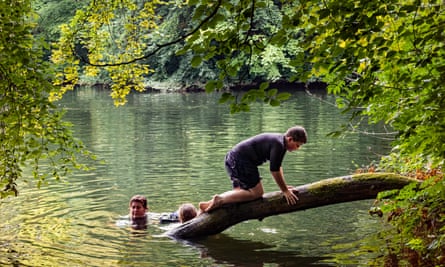
The project was prompted by a visit by Philip Alston, the UN poverty expert, to the UK in 2019. He concluded that the impact of austerity was greatest on single-parent families. Braden started looking at some of the prejudices that manifest in countless ways for those left “holding the baby”. She spent time in the homes of mainly mothers and one father – when Covid-19 stopped visits, she set up cameras and lights so they could take photos themselves.
All agree there is never enough attention or money to go around; and inequalities were heightened during the crisis. “At points, I’ve had to work with three small children at home,” says Gemma, a university administrator and mother of Freya, eight, Jack, six, and Elsie, two. Her partner left in 2019. “There is nobody who can take them because of the pandemic, and it means you fail at everything. How can you parent your children when essentially you need them to go away so you can work? And how can you have the concentration to complete your tasks when you have a two-year-old at home?”
According to the Gingerbread charity, single-parent families were more than three times as likely to have relied on food banks during the crisis, compared with coupled families, and 49% of single parents reported taking on more debt, with almost one in 10 falling out of employment during the last year.
But the difficulties experienced by single parents pre-date the pandemic. Inflexible employers, childcare challenges, being overlooked for promotion: the daily battle takes many forms. There are systems in place to help – for example, child maintenance, the money one parent should pay another towards a child’s upbringing. But the Child Maintenance Service has accumulated a backlog of nearly £400m in unpaid child maintenance in six years. (This is in addition to the £4bn of unpaid child maintenance under the previous Child Support Agency.) Of those not paying child maintenance, 94% are men. Families can claim universal credit, but it is limited to two children. “I didn’t plan to be in this situation,” Gemma says. “By not giving Elsie money, all the children get less money and that just seems incredibly unfair.”
As well as the struggles and inequalities, Braden’s project captures the imagination, determination and pride of single-parent families; unique bonds between parent and child, forged by freedom, love, adventure – and exhaustion. As one mother in the exhibition says, “I explain to my daughter: ‘Look, it’s only me, and you need to help.’ But I’d like to think that she is proud. She’s not got anything to be ashamed of, or to hide from. It is the way we are.”
Jana with Izaan, five, and Yaana, two
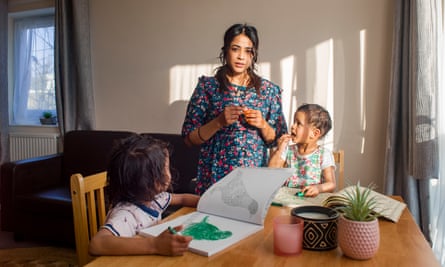

Jana is a market researcher who fled an arranged marriage two years ago. ‘I took Yaana’s car seat, milk bottle and some of their clothes, and called a taxi at one in the morning.’ After living in a women’s refuge, and on the third floor of a building with no lift, she’s now settled in a flat with a balcony. She starts at Imperial College London in September, studying materials science and engineering.
‘Two years ago, if someone had told me I’d be living in London by myself, taking care of my children by myself, and had a place at university, I would have never believed it. My old self would have never recognised who I am today.’
Barbeline with Elijah, nine
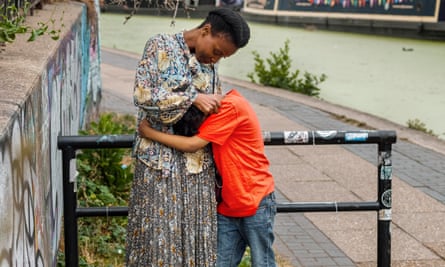
Barbeline grew up in care and had Elijah when she was 18. She was with his dad for two years: ‘He wasn’t happy that I didn’t have to rely on him. I’m always able to get on by myself.’ In 2012 she set up a business producing designs for clothes, cushions and wallpaper.
‘Society puts the blame on the mother,’ she says. ‘A single mum is full of excuses, doesn’t like to work, just wants benefits. They can make you feel horrible in the jobcentre. It made me feel so low. I thought, wow, I need to do better for myself. Society blames single mums for their children’s behaviour, too, but I’ve seen children who live with their fathers still behaving badly at school.’
Fran with Dominic, 12, and Penny, 13


Fran, an NHS Covid-19 vaccinator, was 36 when she left her partner in 2012. Having grown up on a farm in Shropshire, she likes the peace and freedom of rural life and believes it is better for Penny, who has learning disabilities: ‘She’s very naive. If we moved to the town, she might fall in with the wrong crowd.’ Home is a three-bed house: ‘Penny’s in the big room; she needs it to dance in and see her friends. I’m in the box room with two dogs and a cat. My ex has the children every third weekend; I usually pack the tent up, meet him at the motorway service station, then go away with the dogs. Just chilling on my own.’
Gemma with Freya, eight, Jack, six, and Elsie, two
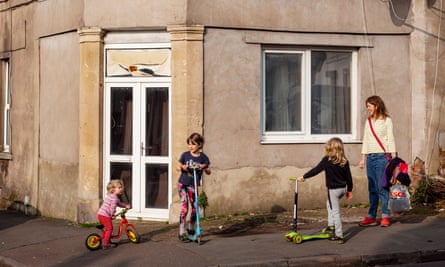

Gemma, a university administrator, met her partner when they were students. They lived together, graduated together, got jobs together. Then he left her with three children. ‘I was always in awe of single mothers,’ she says. ‘I couldn’t imagine having to do it all by myself. Now I’ve come to realise that actually I already was. I’m happier now; I have aspirations I didn’t have before. When Elsie turns three, I’m entitled to more nursery hours, then I can start looking more at what I want to do.’ As for ever being with someone else, ‘I can’t imagine how he’d fit into our life. I’d be auditioning on behalf of four people.’
Charmaine with Esme, 11, and Kai, 13

Aaron with Esme

Charmaine, a theatre practitioner, and Aaron, who’s training to be a drama teacher, met at drama school when they were 18. They separated eight years ago and now share care of their children, half the time each.
‘Men literally just have to change a nappy in public and they’re seen as the greatest father,’ says Charmaine (pictured with their children on the beach in Hove, East Sussex, last summer). ‘They don’t have to do much. As a single mother, you’re always judged.’ Aaron (pictured with Esme, having a spring clear-up on their allotment) agrees: ‘I get cast with this halo. “Oh, he’s brilliant. He hasn’t run off with another woman and disappeared out of the children’s lives.” I really like doing the school run and taking Esme to football and driving them around. I lost my mum very early in my life. I want them to remember me.’
